Sounds like a leaky seal. It might have gotten clogged up with old break fluid and dirt/grime etc after the incident which causes it to appear as though there isn't a problem.
You are using an out of date browser. It may not display this or other websites correctly.
You should upgrade or use an alternative browser.
You should upgrade or use an alternative browser.
Brake failure question
- Thread starter grumpyoldman
- Start date
- Status
- Not open for further replies.
There's likley a bubble now floating around im your break lines too and it will eventually manifest itself if a clogged up leak doesn't break loose first.
Look at all the calipers and the master cylinder for leaks. Then fix it and bleed the brake's starting from furthest. To closest to the master cylinder.
Look at all the calipers and the master cylinder for leaks. Then fix it and bleed the brake's starting from furthest. To closest to the master cylinder.
Boiling brake fluid.
I had an identical sounding "mystery" failure which "disappeared". I hadn't changed the brake fluid in the almost 5 years since I bought the car, and on investigation, one of the rear brake shoe linings had detached and jammed under the other shoe, effectively dragging, and therefore heating, the brakes. A stuck handbrake, or just riding the brakes, could probably have the same effect.
Loads of online pundits told me my master cylinder was toast, and it might be, but there hasn't been any recurrence in nearly two years, and no one had any explanation for an intermittent master cylinder failure. This didn't seem to dent their certainty at all.
My bet is replacement of your brake fluid will solve your immediate problem.
However, its quite likely that water in your fluid has caused corrosion, and you'll have some component (calipers, wheel cylinders, maybe the master cylinder) servicing or replacement to do. So far I've only done one wheel cylinder and one caliper.
I had an identical sounding "mystery" failure which "disappeared". I hadn't changed the brake fluid in the almost 5 years since I bought the car, and on investigation, one of the rear brake shoe linings had detached and jammed under the other shoe, effectively dragging, and therefore heating, the brakes. A stuck handbrake, or just riding the brakes, could probably have the same effect.
Loads of online pundits told me my master cylinder was toast, and it might be, but there hasn't been any recurrence in nearly two years, and no one had any explanation for an intermittent master cylinder failure. This didn't seem to dent their certainty at all.
My bet is replacement of your brake fluid will solve your immediate problem.
However, its quite likely that water in your fluid has caused corrosion, and you'll have some component (calipers, wheel cylinders, maybe the master cylinder) servicing or replacement to do. So far I've only done one wheel cylinder and one caliper.
Last edited:
100% spot on, Ducked
to the original poster:
Ignore the pundits and listen to the guy who's been there.
Ducked nailed it.
change your fluid!
brake fluid does not last 18 years.
to the original poster:
Ignore the pundits and listen to the guy who's been there.
Ducked nailed it.
change your fluid!
brake fluid does not last 18 years.
Never said I wasn't
I said to listen to the voice of experience
I said to listen to the voice of experience
Originally Posted By: meborder
100% spot on, Ducked
Thanks.
It is just my interpretation of my (and now the OP's) symptoms, though. I can't prove it, and can't think offhand how you could.
Just to clarify for the OP, although I think wet fluid is probably the cause of your problem, its quite likely that there's some brake binding which is causing it to boil, (though it could also have been driver action.)
IF you can safely test drive with the wet fluid, it might be worth looking for this first, since it'd save on a double-flush. I'd think an IR thermometer might be useful for this, though I didn't use one.
If not, a double-flush might be of some benefit anyway. I've done 4 or 5 flushes in the past year or so due to piecemeal fixes, which is too many. No big deal, since the car isn't ABS so its not tricky to flush or refill, but it would have been more efficient to do all four corners at once, if I'd had time.
NOTE that, if a binding caliper is anything like as sludgy as mine was (and after 18 years it might be), flushing wont clear it and it'll have to be stripped (which is what I did) or replaced (which is what I dd with the wheel cylinder).
http://www.bobistheoilguy.com/forums/ubbthreads.php/topics/4072698/2
NOTE also, that, if you flush the system using pedal pushing, you should be very careful not to exceed the normal range of pedal movement, which is likely to damage seals in a corroded system. I now prefer to (a) gravity flush or (b) use a syringe. I've back-flushed with the syringe using fairly high pressure without any adverse consequences, but have been told that this can cause master cylinder failure, I think by everting seals.
Some related online discussions
http://www.forumosa.com/taiwan/viewtopic.php?f=75&t=149612&hilit=hydraulic+wise#p1692651
This is the (defunct but still, for now, archived) Forumosa site. Quite a lot of misinformation, but there is detailed a mechanical handbrake fault on the Mazda 3 that could credibly lead to these symptoms. I dunno if this could also apply to an old Civic but I'd have thought its unlikely.
http://www.honestjohn.co.uk/forum/post/index.htm?t=109769
This is the UK-based Honest John site. I don't post on there very often because the pundits tend to be pompous and patronising and I get into fights that are a waste of time. Not too bad this time.
"Bolt" (who appears to be a pro mechanic) gets a bit snippy with the suggestion that brake fluid can boil. I'm sure this is an honest opinion, but someone once said (I think in the context of nuclear experts) that it was quite difficult to get someone to see the obvious if their salary depended on them not seeing it.
100% spot on, Ducked
Thanks.
It is just my interpretation of my (and now the OP's) symptoms, though. I can't prove it, and can't think offhand how you could.
Just to clarify for the OP, although I think wet fluid is probably the cause of your problem, its quite likely that there's some brake binding which is causing it to boil, (though it could also have been driver action.)
IF you can safely test drive with the wet fluid, it might be worth looking for this first, since it'd save on a double-flush. I'd think an IR thermometer might be useful for this, though I didn't use one.
If not, a double-flush might be of some benefit anyway. I've done 4 or 5 flushes in the past year or so due to piecemeal fixes, which is too many. No big deal, since the car isn't ABS so its not tricky to flush or refill, but it would have been more efficient to do all four corners at once, if I'd had time.
NOTE that, if a binding caliper is anything like as sludgy as mine was (and after 18 years it might be), flushing wont clear it and it'll have to be stripped (which is what I did) or replaced (which is what I dd with the wheel cylinder).
http://www.bobistheoilguy.com/forums/ubbthreads.php/topics/4072698/2
NOTE also, that, if you flush the system using pedal pushing, you should be very careful not to exceed the normal range of pedal movement, which is likely to damage seals in a corroded system. I now prefer to (a) gravity flush or (b) use a syringe. I've back-flushed with the syringe using fairly high pressure without any adverse consequences, but have been told that this can cause master cylinder failure, I think by everting seals.
Some related online discussions
http://www.forumosa.com/taiwan/viewtopic.php?f=75&t=149612&hilit=hydraulic+wise#p1692651
This is the (defunct but still, for now, archived) Forumosa site. Quite a lot of misinformation, but there is detailed a mechanical handbrake fault on the Mazda 3 that could credibly lead to these symptoms. I dunno if this could also apply to an old Civic but I'd have thought its unlikely.
http://www.honestjohn.co.uk/forum/post/index.htm?t=109769
This is the UK-based Honest John site. I don't post on there very often because the pundits tend to be pompous and patronising and I get into fights that are a waste of time. Not too bad this time.
"Bolt" (who appears to be a pro mechanic) gets a bit snippy with the suggestion that brake fluid can boil. I'm sure this is an honest opinion, but someone once said (I think in the context of nuclear experts) that it was quite difficult to get someone to see the obvious if their salary depended on them not seeing it.
I also vote for a brake fluid change.
I had a 1990 Dodge van a few years ago. Ex Bell Atlantic truck that I got for cheap and probably didn't see new brake fluid ever, including with me (Regrets now, but live and learn.). Was traveling out of state with it and stopped to fuel up and set the parking brake. 100 miles or so up the interstate I had no brakes. Turns out the passenger parking brake hung up and locked the brake on. And the fluid boiled. I wiggled the cable and the brake came loose again. After it cooled down everything was "okay". I drove it a few more hundred miles that weekend with no problems. Got home and inspected it. Here the epoxy that held the lining to the metal of the shoe had completely melted. The lining was just floating around in the drum working fine to the extent that they could in this unbelievable situation.
I have never seen an intermittent failure of a master cylinder.
Equipment people really emphasize the importance of regular hydraulic fluid changes. I have had so many problems with brakes in my life and am convinced that almost all of them could have been prevented by regular brake fluid replacement. Combined with caoting any exposed brake lines with white lithium grease.
I had a 1990 Dodge van a few years ago. Ex Bell Atlantic truck that I got for cheap and probably didn't see new brake fluid ever, including with me (Regrets now, but live and learn.). Was traveling out of state with it and stopped to fuel up and set the parking brake. 100 miles or so up the interstate I had no brakes. Turns out the passenger parking brake hung up and locked the brake on. And the fluid boiled. I wiggled the cable and the brake came loose again. After it cooled down everything was "okay". I drove it a few more hundred miles that weekend with no problems. Got home and inspected it. Here the epoxy that held the lining to the metal of the shoe had completely melted. The lining was just floating around in the drum working fine to the extent that they could in this unbelievable situation.
I have never seen an intermittent failure of a master cylinder.
Equipment people really emphasize the importance of regular hydraulic fluid changes. I have had so many problems with brakes in my life and am convinced that almost all of them could have been prevented by regular brake fluid replacement. Combined with caoting any exposed brake lines with white lithium grease.
Originally Posted By: NibbanaBanana
The lining was just floating around in the drum working fine to the extent that they could in this unbelievable situation.
Not unbelievable for me (see above) though that was the first time I'd seen it. Perhaps its commoner than we think?
Originally Posted By: NibbanaBanana
...Combined with caoting any exposed brake lines with white lithium grease.
That'd do it. I rub them with aluminium foil with sunflower oil as a binder. Works quite well.
The lining was just floating around in the drum working fine to the extent that they could in this unbelievable situation.
Not unbelievable for me (see above) though that was the first time I'd seen it. Perhaps its commoner than we think?
Originally Posted By: NibbanaBanana
...Combined with caoting any exposed brake lines with white lithium grease.
That'd do it. I rub them with aluminium foil with sunflower oil as a binder. Works quite well.
Originally Posted By: willbur
So the "pundits" want to know- what was the solution/fix ?
While we're waiting, here's some visible damage from old brake fluid.
This system has had lots of fluid changes lately, but of course that doesn't reverse existing corrosion or properly flush out existing sludge. This wheel cylinder was weeping slightly so I removed it earlier this week.
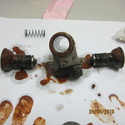
Here its compared with the other wheel cylinder I replaced earlier. This was corroded but had also blown its seal on one piston, probably due to over-travel because the brake shoe liner had detached.

I cleaned it up and put it back on. Doesn't look too bad, but there is some wear evident in the cylinder bore, so it may not last long.
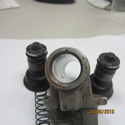
Still have to do the other front caliper, a couple of slightly dodgy looking hoses, and MAYBE the pipes and master cylinder.
So the "pundits" want to know- what was the solution/fix ?
While we're waiting, here's some visible damage from old brake fluid.
This system has had lots of fluid changes lately, but of course that doesn't reverse existing corrosion or properly flush out existing sludge. This wheel cylinder was weeping slightly so I removed it earlier this week.

Here its compared with the other wheel cylinder I replaced earlier. This was corroded but had also blown its seal on one piston, probably due to over-travel because the brake shoe liner had detached.

I cleaned it up and put it back on. Doesn't look too bad, but there is some wear evident in the cylinder bore, so it may not last long.

Still have to do the other front caliper, a couple of slightly dodgy looking hoses, and MAYBE the pipes and master cylinder.
Last edited:
The pictures tell the story. LACK OF MAINTENANCE. I've never seen a brake system in such a sorry state of entropy as what is depicted here. You might as well sell that vehicle for scrap because it is a money hole.
Originally Posted By: HosteenJorje
The pictures tell the story. LACK OF MAINTENANCE. I've never seen a brake system in such a sorry state of entropy as what is depicted here. You might as well sell that vehicle for scrap because it is a money hole.
Man, you havn't lived.
Re lack of maintenance, (its too early here for shouting) sure, that is endemic here and was rather my point. I don't know if the brake fluid was ever changed in the 20 plus years before I got it.
If you read the thread, you'd see that the OP also let his brake fluid get rather old, hence the relevance.
So far, brake interventions have cost me some DOT3, one wheel cylinder, a set of rear brake shoes, and one flex hose (which I'm not sure I needed). Wasn't very expensive.
But scrapping is eventually the fate of all of us.
The pictures tell the story. LACK OF MAINTENANCE. I've never seen a brake system in such a sorry state of entropy as what is depicted here. You might as well sell that vehicle for scrap because it is a money hole.
Man, you havn't lived.
Re lack of maintenance, (its too early here for shouting) sure, that is endemic here and was rather my point. I don't know if the brake fluid was ever changed in the 20 plus years before I got it.
If you read the thread, you'd see that the OP also let his brake fluid get rather old, hence the relevance.
So far, brake interventions have cost me some DOT3, one wheel cylinder, a set of rear brake shoes, and one flex hose (which I'm not sure I needed). Wasn't very expensive.
But scrapping is eventually the fate of all of us.
Last edited:
Snag with being told a car is a "money hole" is you feel obliged to spend money on it.
I just spent 1200NT (about 38 USD total, not itemised) on a radiator hose (which I may never fit since my improvisation is holding so far) and a couple of brake hoses (which look pretty old stock so maybe not that much better than the cosmetically (?) challenged ones on the car, but there's a certain "moral panic" effect with brake parts.)
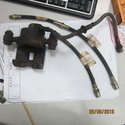
Thats probably about a third of my total 5-year parts expenditure so far (excluding oil filters) so the "money hole" just got deeper. Tsk, tsk.
(The last brake hose I got was much shinier, but I got the President of Ford Taiwan to order it through a Ford main dealer, a pretty funny experience. These days, sadly, I am not so seriously "connected".)
Anyway, since I'm putting "new" hoses on I thought I'd better strip the remaining caliper. It was pretty sludgy (no surprise) with less corrosion in front of the seal than the other one, and a bit more behind. I think it'll clean up OK though.
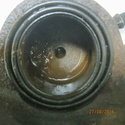
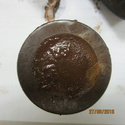
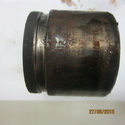
This piston was a lot quicker to extract because I knew to ignore the prevailing internyet bollocks about blowing it out with compressed air, and just use the brake pedal. This time I injected sunflower oil (with a blunted needle) behind the dust seal because I think its a better lubricant than the brake fluid I used last time. I'll use red rubber grease on re-assembly instead of the silicon stuff I used last time.
The old hose is pretty firmly stuck. I'll have to put it back on the car to have any hope of getting it off, since I don't have ready assess to a vice.
I'm thinking if you stripped a corner every year (or six months?), replacing just the fluid lost, that'd keep it fresh indefinately.
I just spent 1200NT (about 38 USD total, not itemised) on a radiator hose (which I may never fit since my improvisation is holding so far) and a couple of brake hoses (which look pretty old stock so maybe not that much better than the cosmetically (?) challenged ones on the car, but there's a certain "moral panic" effect with brake parts.)

Thats probably about a third of my total 5-year parts expenditure so far (excluding oil filters) so the "money hole" just got deeper. Tsk, tsk.
(The last brake hose I got was much shinier, but I got the President of Ford Taiwan to order it through a Ford main dealer, a pretty funny experience. These days, sadly, I am not so seriously "connected".)
Anyway, since I'm putting "new" hoses on I thought I'd better strip the remaining caliper. It was pretty sludgy (no surprise) with less corrosion in front of the seal than the other one, and a bit more behind. I think it'll clean up OK though.



This piston was a lot quicker to extract because I knew to ignore the prevailing internyet bollocks about blowing it out with compressed air, and just use the brake pedal. This time I injected sunflower oil (with a blunted needle) behind the dust seal because I think its a better lubricant than the brake fluid I used last time. I'll use red rubber grease on re-assembly instead of the silicon stuff I used last time.
The old hose is pretty firmly stuck. I'll have to put it back on the car to have any hope of getting it off, since I don't have ready assess to a vice.
I'm thinking if you stripped a corner every year (or six months?), replacing just the fluid lost, that'd keep it fresh indefinately.
Last edited:
Having a bit of trouble stripping the caliper ears. The caliper pins moved apparently OK, but the (upper?) bushing is stuck fast.
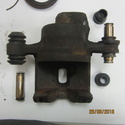
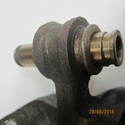
I've tried putting it in boiling water, WD40-style penetrant, and hitting it with a hammer.
Don't want to overdo the boiling water because it'll rust the cylinder.
Might try to rig a threaded rod and press it out.
Can't get the rubber boots (I THINK there are two) off the other ear either. Don't want to tear them, so I suppose they can stay on.


I've tried putting it in boiling water, WD40-style penetrant, and hitting it with a hammer.
Don't want to overdo the boiling water because it'll rust the cylinder.
Might try to rig a threaded rod and press it out.
Can't get the rubber boots (I THINK there are two) off the other ear either. Don't want to tear them, so I suppose they can stay on.
grumpyoldman
Thread starter
OP here. Sorry I haven't followed up until now. I finally got a chance to get back to the car. Test drove it gently without a fluid change. Didn't try to boil the fluid but did enough braking & mashing on the pedal (with the car stopped) to convince myself the master cylinder wasn't obviously bad. Took the car in to the same shop as last time & asked for a complete brake system check. They checked all the friction surfaces, couldn't find any leaks (again), and told me my brake fluid was very dark (as expected).
$80 later the fluid was flushed, and I drove the car 500 miles, mostly highway, since. Seemed fine. So my vote goes with the wise folks here who suggested the fluid had boiled & all that was needed was replacing it. Thanks all!
$80 later the fluid was flushed, and I drove the car 500 miles, mostly highway, since. Seemed fine. So my vote goes with the wise folks here who suggested the fluid had boiled & all that was needed was replacing it. Thanks all!
One day I accidentally left the parking brake on, my 68 Ford Fairlane which has manual 4 wheel drum brakes. I was at a railroad crossing and had to wait some time. Why I set the parking brake, I don't know.
Anyway about 2 miles later, the pedal went to the floor and had minimal braking. I drove carefully and eventually the brakes returned to normal.
What's weird with this car is there is a brake warning light in the instrument cluster but no bulb or socket nor a switch on the level switch on brake reservoir or parking brake! That was back in the days when simple things that we consider standard were considered options. Like carpet for example. I guess having a brake level and parking brake switches were also considered an "option" on cars in 1968.
With my Trabant which also has manual four wheel drum brakes, one time I went to hit the brakes and it went to the floor but the next time the brake pedal was normal. I ended up replacing the master cylinder. About a year prior I had replaced the wheel cylinders, hoses and shoes.
The brakes on Fiat Spider acts weird at times. Usually after I first start it. In this case, I tend to think it has something to do with the power brake booster. If the engine is not running I can press the brake pedal and it only moves about 1". If I start the engine and then hit the brakes, the pedal goes about 1" from the floor.
If I start the engine after getting off work and pull out of the parking lot, as soon as I hit the brakes, the pedal goes almost to the floor then the next time I hit the brakes, they are fine.
Years ago I had a 1986 Honda Prelude. If it rained and I set the parking brake, the next day the brake cables would freeze up. I got to the point to where I would not dare set the parking brake overnight.
If I had to guess. One of the parking brake cables stuck and caused the brake fluid to boil and overheat. Just from what I seen happen with my Fairlane that day.
Anyway about 2 miles later, the pedal went to the floor and had minimal braking. I drove carefully and eventually the brakes returned to normal.
What's weird with this car is there is a brake warning light in the instrument cluster but no bulb or socket nor a switch on the level switch on brake reservoir or parking brake! That was back in the days when simple things that we consider standard were considered options. Like carpet for example. I guess having a brake level and parking brake switches were also considered an "option" on cars in 1968.
With my Trabant which also has manual four wheel drum brakes, one time I went to hit the brakes and it went to the floor but the next time the brake pedal was normal. I ended up replacing the master cylinder. About a year prior I had replaced the wheel cylinders, hoses and shoes.
The brakes on Fiat Spider acts weird at times. Usually after I first start it. In this case, I tend to think it has something to do with the power brake booster. If the engine is not running I can press the brake pedal and it only moves about 1". If I start the engine and then hit the brakes, the pedal goes about 1" from the floor.
If I start the engine after getting off work and pull out of the parking lot, as soon as I hit the brakes, the pedal goes almost to the floor then the next time I hit the brakes, they are fine.
Years ago I had a 1986 Honda Prelude. If it rained and I set the parking brake, the next day the brake cables would freeze up. I got to the point to where I would not dare set the parking brake overnight.
If I had to guess. One of the parking brake cables stuck and caused the brake fluid to boil and overheat. Just from what I seen happen with my Fairlane that day.
Last edited:
- Status
- Not open for further replies.
Similar threads
- Replies
- 17
- Views
- 523
- Replies
- 6
- Views
- 2K
- Replies
- 9
- Views
- 697
- Replies
- 41
- Views
- 3K
- Replies
- 17
- Views
- 867
